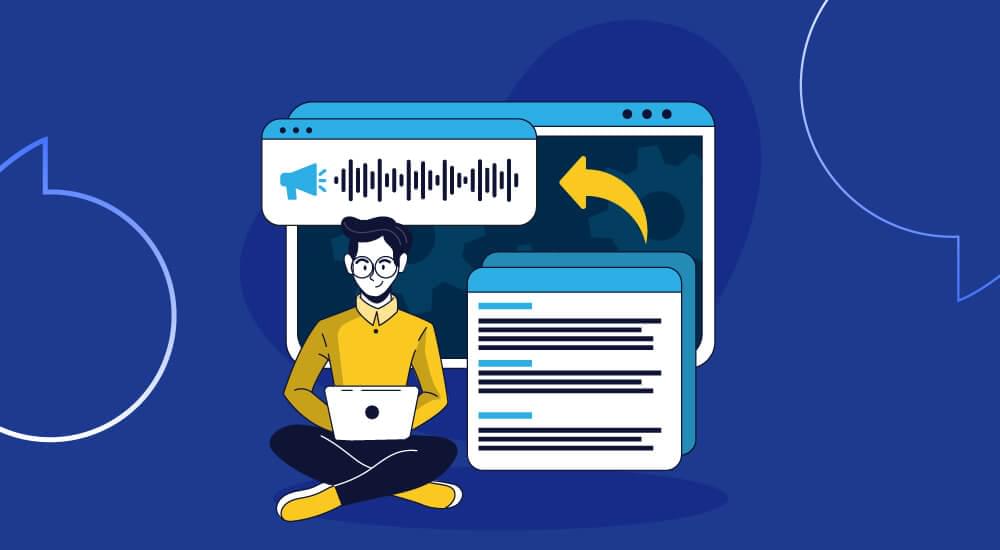text to speech tutorials
Exploring Text to Speech Benefits in Diverse Industries
Have you heard about TTS? Let’s give a little time to see how awesome this technology is!
Text to speech (TTS) technology is bringing a new era in various industries, including business and e-learning while enhancing accessibility. In 2021, the market for text to speech (TTS) technology was worth $2.8 billion. Projections suggest that by 2031, it is expected to surge to $12.5 billion, with a compound annual growth rate (CAGR) of 16.3% from 2022 to 2031.
TTS has several advantages in these sectors, transforming how organizations engage with their clientele and educational platforms.
You won’t believe how seamlessly it converts text into audio recordings and empowers teams to deliver an exceptional customer experience, allowing them to allocate resources more efficiently for other critical business management sectors.
Furthermore, TTS technology produces life-like voices and ensures accuracy so customers and learners consistently access precise information.
In this blog post, we will delve into the top 5 benefits of incorporating TTS into business operations, offering valuable insights to entrepreneurs as they navigate the contemporary technological arena.
Up for it? Let’s begin!
What is Text to Speech (TTS) Technology?

Before we move on to the super fantastic benefits, let’s glance at what exactly TTS is!
Suppose you’ve got some written words and want them to turn into spoken words. Well, that’s where text to speech technology (TTS) can help. The TTS system has innovative software that figures out how to say each word in the best way possible. It also has a unique vocoder program that creates the actual voice sounds.
So, TTS goes from written to spoken words, making it one of the coolest digital technologies.
Simple, right?
How Text to Speech Technology (TTS) Works?

Text to speech (TTS) is a fascinating field combining various knowledge branches. To understand the workings of TTS, you need to have a basic know-how in these different areas. Let’s dig up the science behind TTS:
Linguistics
This is all about understanding how language works. In voice technology, linguistics helps the system figure out how to pronounce written words like a human would. It’s like teaching a computer to speak correctly.
Audio Signal Processing
Audio signal processing is about turning sound into numbers that a computer can understand. In TTS, speech is turned into a sequence of these numbers. It’s like converting spoken words into a secret code that computers can decode.
Artificial Intelligence (AI) & Deep Learning
AI is like the brainpower of TTS technology. Deep learning is a special AI that uses a deep neural network. It is just like a computer brain inspired by how our own brains work. It’s super smart and can learn to process information for the best results. In TTS, it’s used to handle all the complex stuff needed to make speech sound natural.
So, TTS is like a fusion of language knowledge, sound transformation, and advanced computer smarts. It’s a remarkable field that combines science and technology to make computers talk like humans.
8 Powerful Text to Speech Benefits for You and Your Business!
TTS is where innovation meets efficiency, and accessibility transforms how you and your business communicate. Let’s dive into the eight powerful advantages of TTS, offering you a fresh perspective on how this transformative technology can benefit you and your business. Dive!
#1. Increased Accessibility
Let’s talk about text to speech (TTS) software and how it’s like a helpful friend for many people. Suppose you find reading a lot of text difficult for reasons like dyslexia or other learning challenges. TTS comes to the rescue! It’s like your personal reader that reads websites and other written stuff out loud, making it easier for you to understand.
Now, think about people struggling with reading or trying to learn a new language. Reading online can be like a maze of confusing words for them. TTS comes in and makes it simpler. It helps you understand information in a way that sticks in your memory.
And for those with visual impairment, TTS is like a trusty guide. Especially on small screens, reading lots of text can be a real hassle. TTS reads it aloud for you, so you don’t have to do all that annoying scrolling.
#2. Multilingual Support for Business Communication
So, businesses these days want to connect with people worldwide, right?
Smart businesses are using text to speech platforms like WebsiteVoice, which can create life-like voices in 38 languages, making it easy for them to connect with people from different parts of the world. It’s so good that you might even have trouble telling if it’s a human or a robot talking!
TTS helps businesses talk to everyone, no matter where they’re from. They can even make the voices special, so when you chat with them, it feels like they’re talking just to you. It’s like breaking language barriers and giving you a personalized experience, no matter where you are in the world.
#3. Enhanced User Experience and Engagement
Creating great user engagement through website interaction sets businesses apart, and such Text to Speech benefits can take your business to a new height. Here’s how:
- Better Engagement: When you receive a TTS message, it grabs your attention more than a regular text message. The voice adds a new twist to the message, making it more noticeable and likely to get you involved.
- Improved Customer Experience: TTS gives customers a choice - they can listen to messages when they’re on the move, making things super convenient. It adds to their overall satisfaction.
- Prompting Action: TTS messages can even make things happen! They can ask you to do something right away, like confirming appointments, buying stuff, or answering surveys. It’s like a direct call to action!
So, with text to speech tech, publishers, website owners, and businesses can offer a fantastic user experience. It keeps readers engaged and informed, which is super important in our mobile-focused world.
#4. E-Learning for Children and Adults Alike
Printed materials in the classroom, such as books and handouts, can be challenging for children with reading difficulties. This is because some kids have trouble decoding and understanding words on paper. One of the most significant Text to Speech benefits is how it helps eliminate these obstacles via e-learning.
Furthermore, TTS provides a multi-sensory reading experience, allowing children to see and hear the text as they read. According to Research and Markets, the global E-Learning market is ready for significant growth and is expected to expand from $107 billion in 2015 to $325 billion by 2025.
Researchers have discovered that this combination of visual and auditory input when reading has several benefits:
- Enhances word recognition skills.
- Improves the ability to focus and remember information while reading.
- Enables children to concentrate on understanding rather than struggling with word pronunciation.
- Increases children’s endurance for reading assignments.
- Helps children identify and correct errors in their own writing.
It’s worth noting that, like audiobooks, using TTS doesn’t hinder the development of a child’s reading skills.
#5. Time Efficiency
One of the advantages of TTS is time-saving and efficiency, which is a prerequisite for businesses. It turns written stuff into audio, so businesses can quickly share information like product details, news, announcements, or articles with their customers.
What’s cool is that your customers can listen to all this information while doing other things, saving their time too. So, by using this speedy TTS technology, your businesses can boost how much they get done, make customers happier, and stay on top!
#6. Maximum Audience Reach
The internet is full of digital content, where businesses, especially website owners and book publishers, really want to reach more people. One smart way to do that is by turning written stuff into audio, like podcasts and audiobooks.
Text to speech (TTS) technology, with its cutting-edge speech synthesis and robust software, opens up exciting opportunities to connect with a wide range of people.
Adopting a text to speech platform allows you to create top-notch audio blogs that attract a larger audience, going beyond the usual written stuff. It’s like breaking free from the old ways of doing things.
#7. Improve Productivity
Getting the most out of your time is super important. And guess what? With Text to speech (TTS) tech, you do more than one thing simultaneously.
TTS lets you listen to important stuff while multitasking, and that’s like a huge time-saver. It doesn’t just save time; it also makes you more productive because you can handle info smoothly. Whether you’re using voice technology tools online or creating custom voices for TTS, it gives your audience the power to stay in the loop while getting plenty of tasks done.
#8. Training and Learning
TTS technology is changing how we learn. It turns training materials, like text or documents, into audio. This means learners can listen to the information whenever and wherever they want, making learning super flexible.
This helps everyone learn in their own way and also improves understanding because you hear the information as well as read it. Whether it’s changing manuals, presentations, or online courses, text to speech tech gives teachers and trainers the tools to make learning adaptable for all kinds of learners.
The Industry Applications of Text to Speech Technology

TTS has transcended its origins as a niche accessibility tool and has become necessary across multiple sectors, enhancing communication, accessibility, and productivity. Let’s explore the diverse industry applications of TTS technology and the benefits it brings to the table:
Education and E-Learning Industry
It’s indeed good news for the education sector!
One of the most transformative applications of TTS technology is in education and e-learning. It has made education accessible to a broader audience, including individuals with visual impairments or learning disabilities. Textbooks, articles, and online course materials can be converted into audio format, providing an inclusive learning experience. TTS also allows students to listen to complex content while multitasking, increasing overall productivity and comprehension.
Healthcare Sector
In healthcare, time is often of the essence. TTS technology plays a pivotal role in improving efficiency. Doctors can use TTS to convert their notes into spoken format, saving precious time during patient consultations. Moreover, TTS can assist visually impaired healthcare professionals in accessing electronic health records and medical literature, ensuring equal opportunities within the field.
Customer Service and Support Department
The business world has witnessed a revolution in customer service and support, all because of TTS technology. It is projected that by 2020 to 2025, the number of virtual assistants equipped with TTS capabilities will reach 35.1 billion.
Interactive voice response (IVR) systems use TTS to provide automated responses, routing calls efficiently and reducing wait times. This enhances the overall customer experience and smoothens operations for your business.
Media and Entertainment Industry
The media and entertainment industry has widely used TTS to create engaging audio content, such as audiobooks, podcasts, and voiceovers for animation and film. TTS systems can produce natural-sounding voices that captivate audiences and provide accessibility features for those with visual or reading impairments.
Accessibility For All
Perhaps one of the most significant impacts of TTS technology is its contribution to accessibility across various sectors. Websites and apps now incorporate TTS options, allowing individuals with disabilities to access content easily. TTS also benefits the aging population, making technology more user-friendly for seniors.
Finance and Banking Sector
In the finance and banking sector, TTS technology is employed for transaction verification and providing account information over the phone. This enhances security while simplifying customer interactions. Moreover, TTS can convert complex financial reports into audio, helping in quick decision-making by financial professionals.
Retail and E-commerce Business
TTS technology has found a place in retail and e-commerce by enhancing the shopping experience. It enables online shoppers to receive product descriptions, reviews, and promotional content in audio format, improving convenience and accessibility.
Legal Services
The legal profession relies heavily on documentation and research. TTS helps lawyers convert legal documents into spoken format, making reviewing and analyzing information easier. This has streamlined legal processes and increased productivity in this industry too.
Transportation Industry
Even the transportation industry utilizes TTS for various tasks, such as automated announcements in public transit, providing real-time updates for commuters. Did you realize that GPS navigation systems also use TTS for turn-by-turn directions, enhancing safety for drivers?
Languages and Translation Services
TTS technology is super valuable for language learning and translation services. It helps learners practice pronunciation and fluency by providing accurate and natural-sounding audio examples.
The worldwide market for Language Translation Software and Services, estimated at approximately US$57 billion in 2022, is anticipated to expand to a revised figure of about US$84.2 billion by 2030. This growth is projected at a steady compound annual growth rate (CAGR) of 5% during the analytical period from 2022 to 2030.
As the statistics indicate, TTS plays a great role in converting written content into spoken language, facilitating communication in multilingual environments.
Let’s Wrap Up!

Let’s admit that the benefits of incorporating Text to Speech (TTS) technology into various industries cannot be overstated. TTS has become a powerful tool that transcends boundaries, enhancing accessibility, communication, and productivity. From education and healthcare to customer service and entertainment, powerful Text to Speech platforms have demonstrated their capacity to level the playing field, making information and services accessible to all.
Furthermore, the media and entertainment industry has embraced TTS, creating captivating audio content that appeals to a broader audience. In the finance, retail, and e-commerce sectors, TTS has enhanced the customer experience by providing spoken product descriptions and financial information.
In fact, legal services have also benefited from TTS through streamlined documentation and research processes. Lastly, transportation has become safer and more efficient with automated announcements and GPS navigation using TTS technology.
As technology evolves, TTS will likely find new applications and further transform industries. Its ability to generate life-like voices, provide accessibility, and enhance comprehension through auditory experience shows its versatility and adaptability.









